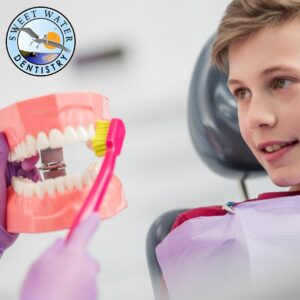What Are the Best Practices for Dental Hygiene?
Taking care of your teeth and gums is crucial for maintaining overall health. Good dental hygiene helps prevent cavities, gum disease, and bad breath. In this blog, we’ll explore the best practices for keeping your dental hygiene in top shape.

Brush Your Teeth Twice a Day
Brushing your teeth at least twice a day is essential for removing plaque and food particles. Use a fluoride toothpaste and a soft-bristled toothbrush to avoid damaging your enamel and gums.
Proper brushing techniques are crucial for maintaining good oral hygiene. It is recommended to hold the toothbrush at a 45-degree angle and brush in gentle, circular motions. Ensure that you brush all tooth surfaces, including the outer, inner, and chewing surfaces.
Don’t forget to brush your tongue to remove bacteria and prevent bad breath. Brushing your tongue can also enhance your sense of taste and overall oral hygiene.
Additionally, consider using a specialized toothbrush, such as an electric toothbrush, which can provide a more thorough cleaning. Many individuals find them easier and more effective at removing plaque.
Remember to replace your toothbrush or toothbrush head every three to four months, or sooner if the bristles are frayed. A worn-out toothbrush won’t clean your teeth effectively.
Floss Daily
Flossing helps remove plaque and food particles from between your teeth and under the gumline where your toothbrush can’t reach. Make it a daily habit for the best results.
Proper flossing techniques are important. Use a gentle back-and-forth motion to avoid injuring your gums. Make sure to floss below the gumline and curve the floss around each tooth.
If traditional flossing is difficult, consider using dental picks, water flossers, or floss holders. These tools can make the process easier, especially for individuals with arthritis or other dexterity issues.
Flossing not only helps prevent cavities but also reduces the risk of gum disease by removing plaque that can lead to inflammation and gum recession.
Use Mouthwash
Mouthwash can help reduce plaque, prevent gingivitis, and freshen your breath. Choose a mouthwash that contains fluoride and other beneficial ingredients for improved oral health.
Using mouthwash as part of your oral hygiene routine can provide additional benefits by reaching areas that your toothbrush and floss may miss. Rinse your mouth with mouthwash for about 30 seconds after brushing and flossing.
Mouthwash can also help kill bacteria that cause bad breath, providing you with fresher breath throughout the day.
Visit Your Dentist Regularly
Regular dental check-ups are crucial for detecting any potential issues early. Your dentist can provide professional cleanings and advice tailored to your specific oral health needs.
During these visits, your dentist will thoroughly examine your teeth, gums, and mouth for signs of dental issues such as cavities, gum disease, or oral cancer. Early detection can lead to timely treatment, preventing further complications.
Regular checkups also allow your dentist to provide professional cleanings, removing plaque and tartar buildup that cannot be eliminated through regular brushing and flossing.
It is generally recommended to visit your dentist every six months, but the frequency may vary depending on individual needs and risk factors.
Limit Sugary Foods and Beverages
Consuming too much sugar can lead to cavities and other dental problems. Try to limit your intake of sugary foods and drinks, and always brush your teeth after consuming them.
Sugary snacks and beverages promote the growth of bacteria that cause tooth decay. Consider healthier alternatives such as fruits, vegetables, and water.
If you do consume sugary foods or drinks, it’s best to do so during or after meals when saliva production is increased. This helps wash away sugar and neutralize acids.
Avoid Tobacco Products
Tobacco products can cause severe dental issues, including gum disease and oral cancer. Avoiding tobacco is one of the best ways to maintain excellent oral health.
Smoking and chewing tobacco can lead to tooth discoloration, bad breath, and a compromised immune system in your gums, making it harder to fight off infections.
Quitting tobacco can significantly improve your oral and overall health. If you need help quitting, consider seeking support from healthcare professionals or cessation programs.
Stay Hydrated
Drinking plenty of water helps wash away food particles and bacteria, reducing the risk of cavities and gum disease. Staying hydrated is an easy way to support your dental hygiene.
Water is not only beneficial for your overall health, but it also helps maintain a healthy pH balance in your mouth, keeping harmful bacteria at bay.
Consider using water as a tool to rinse your mouth during the day, especially after meals. This can help cleanse your mouth and minimize the buildup of food particles and plaque.
Final Thoughts on Dental Hygiene
By following these best practices for dental hygiene, you can ensure a healthy and beautiful smile for years to come. Remember, good oral care is not just about appearance, but also about maintaining overall health. Happy brushing!
To schedule a consultation and learn more about your dental implant options, contact Sweet Water Dentistry today!
Visit us for expert care:
Sweet Water Dentistry
📍 5915 Sweetwater Cir, Fairhope, AL 36532
🌐 sweetwatersmile.com
📞 Call or Text: (251) 210-2773
Follow us on Facebook and Instagram for the latest updates and special offers!
